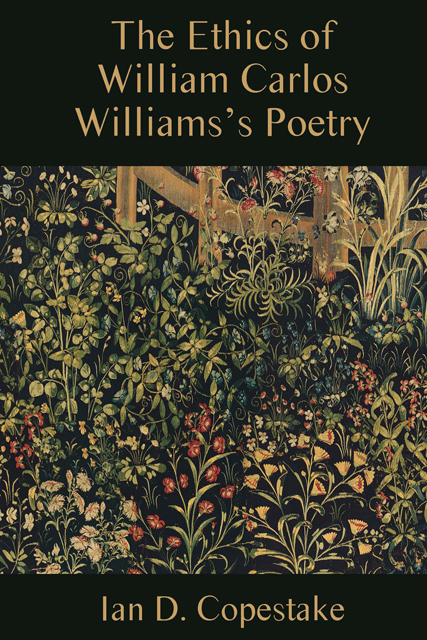Book contents
- Frontmatter
- Contents
- Acknowledgments
- List of Abbreviations
- Introduction
- 1 The Basis of Williams’s Faith in Art
- 2 Williams among the Pre-Raphaelites
- 3 A Pragmatic Approach: Williams and Emerson
- 4 Making a Start Out of Particulars: Paterson’s “Redeeming Language”
- 5 The Struggle to Believe: Williams’s Poetry of Service, Work, and Self
- Conclusion: Williams’s “Lifetime of Careful Listening”
- Bibliography
- Index
- Miscellaneous Endmatter
Conclusion: Williams’s “Lifetime of Careful Listening”
Published online by Cambridge University Press: 16 February 2023
- Frontmatter
- Contents
- Acknowledgments
- List of Abbreviations
- Introduction
- 1 The Basis of Williams’s Faith in Art
- 2 Williams among the Pre-Raphaelites
- 3 A Pragmatic Approach: Williams and Emerson
- 4 Making a Start Out of Particulars: Paterson’s “Redeeming Language”
- 5 The Struggle to Believe: Williams’s Poetry of Service, Work, and Self
- Conclusion: Williams’s “Lifetime of Careful Listening”
- Bibliography
- Index
- Miscellaneous Endmatter
Summary
STUDYING THE NATURE AND ORIGINS of the “moral question” that Williams felt was at the heart of his modernist concern with language brings to the fore the question of what comparable legacy this offers in terms of the role special attention to language can play in reviving the health of contemporary habits of thought. Ironically, given Williams’s at timesentrenched opposition to academic specializations of knowledge, Robert Scholes argues that the impact of language awareness, and the absence of it, on our capacity for independent thought and judgment places a practical value on literary or textual studies. In offering Scholes’s argument as an analogy for Williams’s own justification for the practical basis of his art, I want to quote Scholes’s summary of his position:
The students who come to us now [in 1985] exist in the most manipulative culture human beings have ever experienced. They are bombarded with signs, with rhetoric, from their daily awakenings until their troubled sleep, especially with signs transmitted by the audio-visual media. And, for a variety of reasons, they are relatively deprived of experience in the thoughtful reading and writing of verbal texts… .
What students need from us … is the kind of knowledge and skill that will enable them to make sense of their worlds, to determine their own interests, both individual and collective, to see through the manipulations of all sorts of texts in all sorts of media, and to express their own views in some appropriate manner… .
In an age of manipulation, when our students are in dire need of critical strength to resist the continuing assaults of all the media, the worst thing we can do is to foster in them an attitude of reverence before texts… . It is the attitude of the exegete before the sacred text; whereas, what is needed is a judicious attitude: scrupulous to understand, alert to probe for blind spots and hidden agendas, and, finally, critical, questioning, skeptical.
As I have suggested, for Williams, as for Emerson, language was both a problem and a solution to its own problem, and Scholes echoes the same concerns when he draws on a variety of poststructuralist theories to illustrate a connection between what he calls a “material thing” such as an utterance or a text, and an “immaterial thing.”
- Type
- Chapter
- Information
- The Ethics of William Carlos Williams's Poetry , pp. 143 - 152Publisher: Boydell & BrewerPrint publication year: 2010



